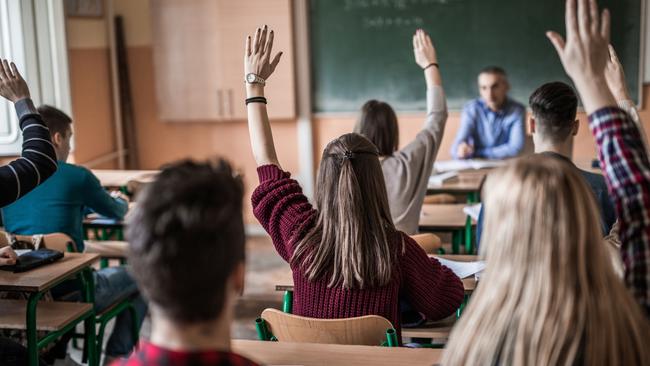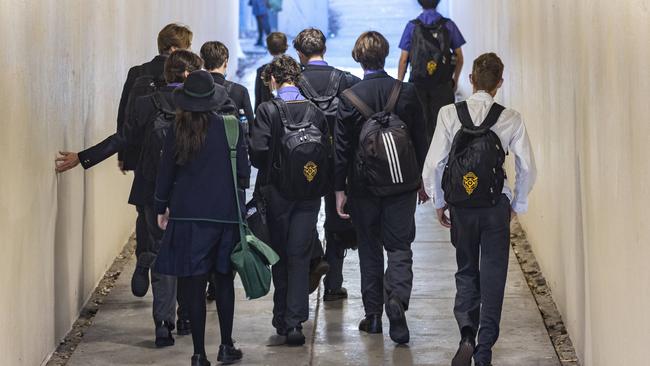PISA reveals impact of Covid on Aussie teens’ education
A new study has revealed the concerning results about Year 10 students and the full impact of Covid school closures. See results.
National
Don't miss out on the headlines from National. Followed categories will be added to My News.
The full toll of Covid school closures on Australian teenagers has been laid bare, with many saying they felt anxious about their school work and battled to find the motivation to learn during the pandemic.
The 2022 Programme for International Student Assessment (PISA) test, the first large-scale study to track student performance and wellbeing before and after Covid disruptions, reveals widespread issues with remote learning among the 15-year-olds who were surveyed.
One in three said they struggled to find the motivation to do their school work every day that their classrooms were closed, with only 11.8 per cent saying motivation was never an issue.
Overall, 53.5 per cent of Australian 15-year-olds said their school had been closed for less than three months, compared to an average of 49.5 per cent across OECD countries.
The overwhelming majority of the students – most of whom were in Year 10 when they were surveyed last year – said they missed playing sport and other school-organised physical activities during the rolling lockdowns that up-ended their previous two years of schooling.

Of those who sat the PISA test, 40.5 per cent said they were not well prepared to learn on their own, with most at least occasionally unable to find a quiet place to study at home and left without anyone to ask for help.
One in two felt anxious about their school work while their classrooms were closed, 41.8 per cent felt lonely, and 36.7 per cent did not enjoy learning by themselves.
While 71.6 per cent of the 15-year-olds surveyed said their teachers were available when they needed help during lockdowns, 37.3 per cent indicated the staff at their school were not well prepared for remote learning.
The 2022 PISA test uncovered an unprecedented drop in student performance worldwide, although OECD Secretary-General Mathias Cormann – the former Australian finance minister – said the relationship between school closures and performance was “not so direct”.
He said there was “no clear difference” recorded in trends between countries with limited and longer periods of remote learning.
Andreas Schleicher, the OECD’s skills and education director, added that it was difficult to “disentangle the impacts of Covid” from other factors that fuelled the overall slump in student performance.
“One of the mistakes one should avoid is to say this is all about Covid so it’s all gone away,” he said in an interview.
“I think there are many structural factors … that do not relate to Covid.”
A substantial minority of Australian students surveyed indicated they would have difficulties motivating themselves, finding learning resources, and completing work independently if their classrooms were closed again in the future.
SECRET LIFE OF A 15-YEAR-OLD
Australian teenagers are more likely to feel lonely, awkward and ostracised at school than their peers overseas, with a quarter of 15-year-olds revealing they are regularly bullied.
Thousands of Australian students who completed the PISA test also filled out a 35-minute questionnaire about their lives, in which three out of ten teenagers said they felt as though they did not belong at school.
The survey also shed light on the unhealthy attachment of teenagers to their digital devices, finding that less than half of 15-year-olds consistently turned off social media notifications when they went to bed while 23.5 per cent always left the alerts switched on overnight.
Nearly one in 10 students surveyed said they always felt anxious if they were not near their smartphones, tablets and computers.
And amid the concerning results about Year 10 students struggling to fit in at school, the PISA report identified that their parents were showing less interest in their education.
Only 29 per cent of parents proactively discussed the progress of their children with their teachers last year, down from 40 per cent in the last PISA survey.
OECD education and skills director Andreas Schleicher said that was a factor that contributed to the long-term decline in student performance in Australia.
“That was quite striking to me, that there are now fewer parents than in 2018 who take the initiative,” he said.
According to the report, 26 per cent of boys and 24 per cent of girls reported they were victims of bullying at least a few times a month, compared to the OECD average of 21 per cent of boys and 20 per cent of girls.

About one in ten 15-year-olds said they did not feel safe in parts of their school – such as the hallway, cafeteria or bathroom – while seven per cent felt unsafe in the classroom and five per cent felt unsafe on the way to school.
While 77.6 per cent of those surveyed said they made friends easily at school, the report identified a significant minority of students – which was more sizeable than in comparable countries – who struggled to fit in.
One in four students felt awkward and out of place, 18.1 per cent felt lonely and 21.1 per cent felt like an outsider.
Principals at the 743 Australian schools which took part in PISA reported that 22.1 per cent of their students were likely to be transferred elsewhere because of behavioural problems.





